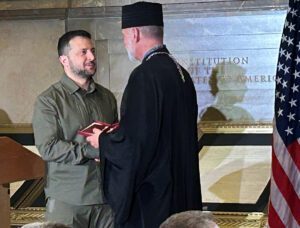(OSV News) – A U.S. Ukrainian Catholic archbishop was honored by Ukraine’s president for his decades-long efforts to foster that nation’s development.
Metropolitan Archbishop Borys Gudziak of the Archeparchy of Philadelphia received the Cross of Ivan Mazepa from Ukrainian President Volodymyr Zelenskyy Sept. 21 in Washington. Zelenskyy visited the U.S. capital for meetings after addressing the United Nations General Assembly in New York Sept. 19.

Established in 2009, the award honors individuals who have made “significant personal contribution to strengthening interstate cooperation, support of state sovereignty and territorial integrity of Ukraine, and popularization of the Ukrainian state in the world,” according to a press release from the Ukrainian Greek Catholic Church.
The Cross of Ivan Mazepa is named for a 17th-century “hetman” — a military commander and statesman — who sought to unite Ukrainian territories of the time as a European-facing state that retained its traditional heritage. During his career, Mazepa promoted Ukrainian economic development, scholarship, literature, arts and architecture, and funded the construction of numerous churches. His rule is often called the “Mazepa Renaissance.”
Also receiving the award, announced in a Sept. 4 presidential decree by Zelenskyy, were Ukrainian Orthodox Father Volodymyr Steliac, rector of the Ukrainian Orthodox Cathedral of St. Andrew the First-Called in Silver Spring, Maryland; Alla Lopatkina, president of the Chicago-based Ua-Resistance Foundation; and Hakan Kirimli, associate professor of international relations at Bilkent University in Turkey.
During the award ceremony, which took place at the U.S. National Archives, Ukrainian first lady Olena Zelenska noted she had “the honor of knowing Archbishop Borys Gudziak personally.”
Earlier this year, Zelenska and Archbishop Gudziak jointly participated in a Jan. 17 panel discussion at the World Economic Forum in Davos, Switzerland, discussing the physical, psychological and emotional trauma of war, forgiveness and their dreams for Ukraine’s future.
Zelenska noted at the award ceremony that Archbishop Gudziak “is known to thousands of Ukrainians — soldiers, displaced persons, and many others whom he helps, and young people who, thanks to him, get a great education.”
The archbishop — a native of Syracuse, New York, born to Ukrainian immigrants — has long championed Ukrainian educational initiatives.
A trained historian who holds a doctorate in Slavic and Byzantine cultural history from Harvard University, the archbishop moved to Lviv in western Ukraine in 1992, founding and directing the Institute of Church History.
The following year, he chaired a commission to renew the Lviv Theological Academy, of which he served as vice rector and then rector from 1995 to 2002. He then became rector of Ukrainian Catholic University, established on the basis of the academy, and became its president in 2013. The university has become a model for Ukrainian higher education, scholarship, disability awareness, human rights advocacy and social innovation.
During Ukraine’s 2013-2014 Maidan movement — which saw the populace reject a pro-Kremlin government at the time and decisively reorient the nation towards the European Union — Archbishop Gudziak regularly appeared on international television, providing expert commentary and active support.
As Ukraine battles a full-scale invasion by Russia that continues attacks launched in 2014, that struggle continues, said Zelenska.
“Ukraine is defending values — such as a right to life and personality,” she said. “These are not only physical things but also intangible values. The defenders of Ukraine are very different people — of different views, beliefs, or not religious at all.
“But they all clearly feel they are fighting against evil, against the worst that might be born within a human — a conscious effort to kill, destroy, grab, and enslave,” said Zelenska. “Therefore, it is also a spiritual battle. Sincere gratitude to everyone who fights together with us in the spiritual dimension and dimension of values.”
